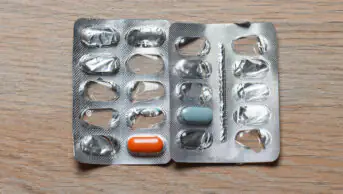
Algis Motuza / Alamy Stock Photo
The government has issued the first serious shortage protocols (SSP) to combat shortages of the antidepressant fluoxetine.
The SSPs, issued on 3 October 2019, allow pharmacists to supply alternative strengths or pharmaceutical forms of fluoxetine without having to consult a patient’s prescriber, with immediate effect.
The measures have been put in place following news that manufacturing issues have resulted in shortages of some fluoxetine 10mg, 30mg and 40mg capsules. It has been estimated that some of these stocks will not be available until early December 2019. A separate protocol has been introduced for each strength of the drug.
Legislation came into force on 1 July 2019 that introduced a pharmacist’s ability to dispense against a protocol instead of a prescription, without going back to the prescriber first, as a measure to combat medicines shortages. This protocol was drawn up by a team of senior pharmacists and doctors, including Keith Ridge, the chief pharmaceutical officer for England.
The SSPs will remain in place for as long as manufacturing issues mean the drug is in short supply, to help alleviate pressure on the supply chain.
Sandra Gidley, president of the Royal Pharmaceutical Society, welcomed the announcement: “If a pharmacist can sort out a patient’s requirements from existing stock it will save a lot of time and this can only be good news for patients,” she said, adding that fluoxetine substitutions were fairly straightforward to carry out.
The government has also announced restrictions on exporting of 19 hormone replacement therapy (HRT) products to tackle shortages. Several HRT products manufactured by Resource Medical, Themex and Mylan will soon be out of stock, with some not expected to be available until mid-2020.
The restrictions will also prevent medicine wholesalers from parallel exporting — where companies buy medicines meant for UK patients and sell on for a higher price in another country.
“These shortage problems have been in existence for more than ten years,” said Gidley. “Although they are worse now than ever, the prime consideration must be patients — anything the government can do to ensure they get their medicines is welcomed.”
Exporting restrictions have also been brought in for a further five medicines, including all adrenaline auto-injectors and hepatitis B vaccines, which have also been in short supply.
Announcing the measures in a press release, the Department of Health and Social Care (DHSC) said the use of the SSPs and the export ban were unrelated to Brexit, but added that SSPs and exporting restrictions “provide the DHSC with additional tools to our robust, multi-layered preparations for exiting the EU”.
Rick Greville, director of supply chain at the Association of the British Pharmaceutical Industry, said the precautionary measures would be “welcomed” by its members, who have been asked by the government to maintain rolling six-week stockpiles of medicines in case of a no-deal Brexit.
“[These measures] mean that these stockpiles of medicines that companies have built over previous months are better protected and available for use only by the NHS patients for which they were intended,” he said.
Martin Sawer, executive director of the Healthcare Distribution Association (HDA), which represents wholesalers, said its member companies believed that a small number of firms that hold a Wholesale Dealer Licence (WDL) may be buying small amounts of stock from a number of locations and then exporting aggregated packs of these medicines.
Sawer said the HDA was calling on the Medicines and Healthcare products Regulatory Agency to consider a “more rigorous and transparent enforcement” of the obligations on all WDL holders in line with good distribution practice (GDP) legislation.
GDP legislation includes an obligation on WDL holders to ensure an “appropriate and continued supply of such relevant medicinal products to pharmacies and persons who may lawfully sell such products … so that the needs of patients in the UK are covered”.
Matt Hancock, the health secretary, said that people should be “fully reassured” that the government would always act to ensure that there was an adequate supply of the medicines needed by patients.
- This article was amended on 3 October 2019 to reflect that three serious shortage protocols were introduced by the DHSC to help deal with fluoxetine shortages.


